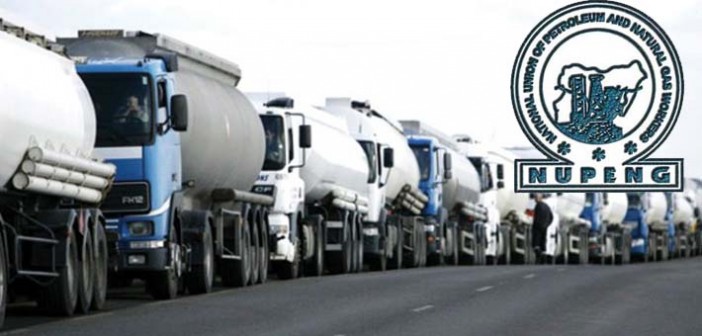 Fuel was sold on the black market during a previous strike
Fuel was sold on the black market during a previous strikeThe unions, Pengassan and Nupeng, said the strike would continue until the government addressed its concerns.
These include the adoption of the delayed Petroleum Industry Bill, aimed at overhauling the sector and maintenance work on oil refineries.
The unions frequently go on strike or threaten to strike.
This time, the two unions were initially demanding the reinstatement of representatives who had been dismissed by oil companies, but now their list of complaints has grown.
They are now protesting that the government has allowed Nigeria’s oil refineries to fall into disrepair and that the poor state of the country’s roads is hindering the transport of oil.
They are also asking for the price of petrol to be reduced and oil theft to be stopped.
“We’ve commenced the strike. It will affect oil production, since all operations are on strike,” Pengassan chief Babatunde Oke told Reuters.
However, an oil executive said the strike was not expected to affect output, because it would require the co-operation of large numbers of workers at production sites who would be unwilling to go that far.
“It’s very difficult to shut them down, and once they do, it would take them a week to get them back up. They never do it. That’s the last thing anyone wants,” an oil executive told Reuters.
The BBC’s Will Ross in Lagos said most of the unions’ demands seemed “unrealistic, especially with an election looming”.
“The refineries are not suddenly going to be fixed because of this strike. Some oil industry watchers suggest the unions are simply trying to force the government to pay them off and get a hefty Christmas present,” he added.
A strike in September had little impact on oil production.
Many Nigerians, whether Christian or Muslim, travel home over the Christmas and New Year holidays and so they are stocking up on fuel now, in case of shortages in the next couple of weeks, analysts say.
FRENCH VERSION
Le marché de Afrika voir de longues files d’attente ont formé àplusieurs garçons de zone stationswhile essence et mécréantsvente huile aux automobilistes aux taux du marché noir
Les syndicats, Pengassan et Nupeng, a déclaré que la grève sepoursuivrait jusqu’à ce que le gouvernement dans sespréoccupations.
Il s’agit de l’adoption du projet de loi retardée Petroleum Industry,visant à réviser le travail de secteur et de la maintenance sur lesraffineries de pétrole.
Fréquemment, les syndicats font grève ou menacent de grève.
Cette fois, les deux syndicats réclamaient initialement lerétablissement des représentants qui avait été rejeté par lescompagnies pétrolières, mais maintenant leur liste de plaintes aaugmenté.
Ils protestent maintenant que le gouvernement a autorisé lesraffineries de pétrole du Nigeria à tomber en désuétude et que lemauvais état des routes du pays constitue un obstacle autransport de pétrole.
Ils sont également demander pour le prix de l’essence à êtreréduite et vol de pétrole à être arrêté.
“Nous avons commencé la grève. Il va affecter la production depétrole, puisque toutes les opérations sont en grève,”a déclaré àReuters Pengassan chef Babatunde Oke.
Cependant, une huile de la direction a déclaré que la grève nedevrait pas affecter la sortie, parce qu’elle aurait besoin de lacoopération d’un grand nombre de travailleurs sur les sites deproduction qui seraient réticents à aller aussi loin.


